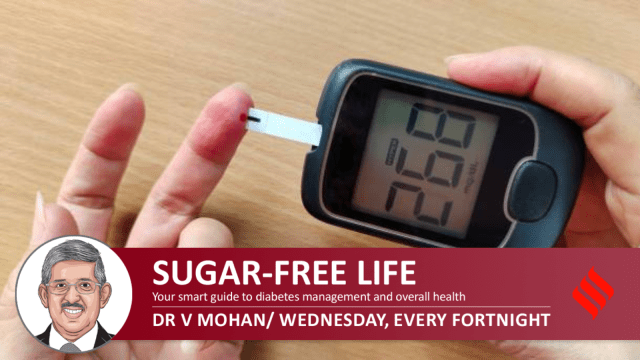32-year-old had high blood sugar despite being thin, eating clean and exercising: How much do genes really matter?
Genes have a powerful role in how your blood sugar is processed and how effectively your pancreas works. You have to work extra
 If both parents have diabetes, their child would have a 100 per cent risk of developing diabetes.
If both parents have diabetes, their child would have a 100 per cent risk of developing diabetes.A 32-year-old patient of mine was shattered when he was first diagnosed with diabetes. That’s because he had followed the playbook — eating mindfully, watching his weight and regularly exercising. The only factor he couldn’t control was his genetics. “My parents and grandparents have diabetes. Is it because of my family history? What more should I do to control my blood sugar?,” he asked.
Family history of diabetes plays a vital role. If both parents have diabetes, their child would have a 100 per cent risk of developing diabetes. If the grandparents also have diabetes, then diabetes is inevitable. It does not matter whether you are thin. Genes have a powerful role in how your blood sugars are processed and how effectively your pancreas works. So you need to make an extra effort.
Why you can develop diabetes with family history
You may be active and thin-built. But the beta cells of the pancreas, which produce insulin, get burnt out early. Some people have a strong genetic predisposition where their pancreas simply cannot produce enough insulin, regardless of their lifestyle. Even at a lean body weight, small amounts of excess abdominal fat can lead to increased insulin resistance.
What if one follows diet and exercise? What else could then be a trigger?
While my 32-year-old patient was following lifestyle routines, he didn’t take care of his stress levels. Stress is one of the most overlooked causes of high blood sugar levels. It causes your body to release the hormones named cortisol and adrenaline, which can raise blood sugar levels. Over a period of time, this constant stress response can contribute to insulin resistance and early onset of diabetes. Managing stress is important just like diet or exercise.
Does family history mean you can’t avoid diabetes at all?
Not necessarily. Think this way, your genes are like a gun loaded with bullets but your lifestyle is the trigger which brings out diabetes. Genetics may set the stage, your lifestyle determines when or whether you can develop diabetes. Many people, even though they have a strong family history, can delay the development of diabetes by 10 to 20 years.
How do I control my blood sugar with genetic history?
In the early stage, your diabetes can go into remission. However even if you cannot do so completely, just follow the ABCD technique, which can help you prevent complications. What is this ABCD?
A – HbA1c: It is your three-month average blood sugar levels. You must keep it below 7%.
B – Blood Pressure: Try to keep your blood pressure within normal limits. High BP and diabetes increase the risk of heart and kidney diseases.
C – Cholesterol: Test your cholesterol levels and keep them under control. Managing cholesterol protects your heart and arteries.
D – Discipline: Stay disciplined with your diet, stress, sleep and overall lifestyle. Mindful eating practices, regular exercise and stress management are the keys.
By combining diet, exercise, consistency, awareness and regular medications, even genetically predisposed individuals can take charge of their health. Diabetes may run in families, but with the right steps, you can either prevent it or control it, so that it does not produce any complications in you. Monitor your sugar levels strictly. Since you can’t change your family history, focus on the factors you can control to delay or prevent the onset of diabetes. Have whole foods and add strength training to your routines to build lean mass.
(Dr Mohan is chairman, Dr Mohan’s Diabetes Specialities Centre, Chennai)



- 01
- 02
- 03
- 04
- 05




























